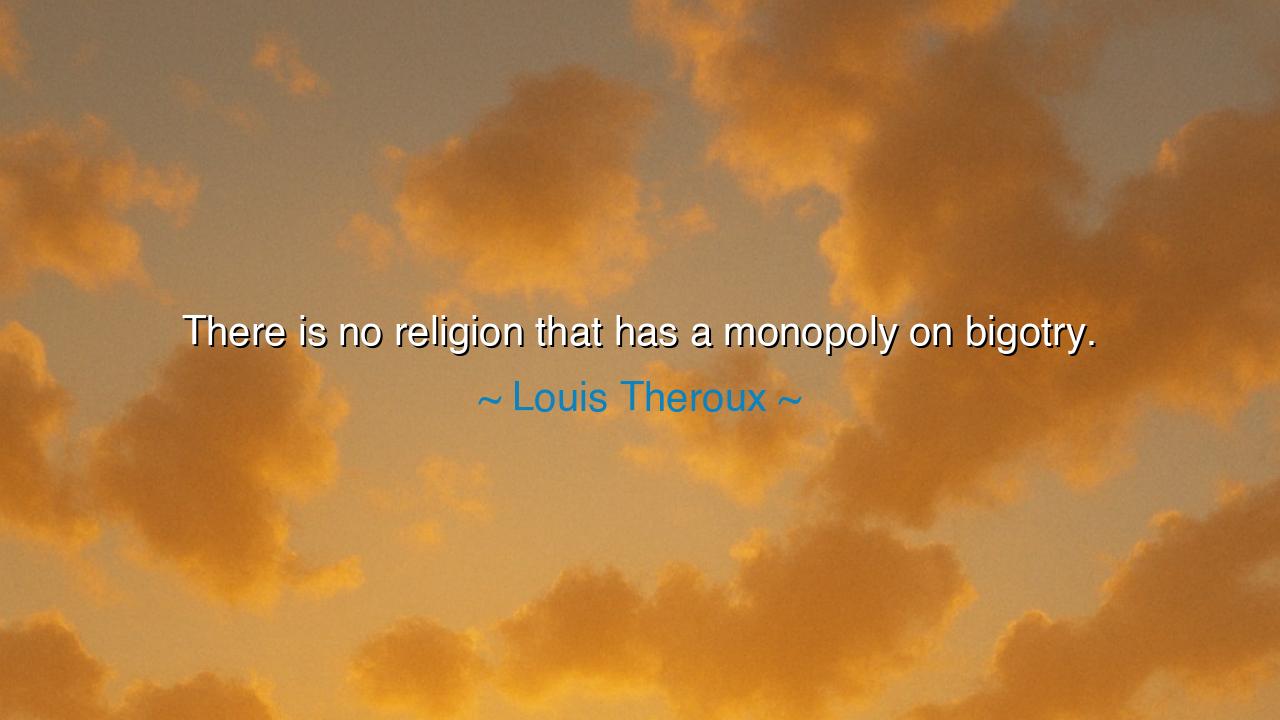
There is no religion that has a monopoly on bigotry.






The words of Louis Theroux — "There is no religion that has a monopoly on bigotry." — cut to the heart of human weakness with both clarity and sorrow. In them, he reminds us that while religions often speak of love, compassion, and truth, the shadows of bigotry have found a home in every tradition. No faith, however noble in its origin, is free from the danger of being twisted by prejudice, fear, and pride. Theroux’s words call us to humility: we cannot point to one creed as the sole harbor of intolerance, for intolerance is not the child of a single religion, but of the human heart itself.
The origin of this truth lies in the history of mankind’s spiritual search. Every great faith was born in fire — a revelation of the divine, a call to justice, a cry for mercy. And yet, as centuries passed, the pure flame was too often surrounded by the smoke of human imperfection. Followers who sought to protect their beliefs sometimes turned to exclusion, suspicion, or violence. In this way, the noble teachings of prophets and sages became veiled in bigotry, not because of the faith itself, but because of the frailty of those who practiced it.
History speaks loudly of this pattern. Consider the Christian Crusades, where armies marched under the banner of the cross, claiming to fight for God, yet leaving behind rivers of blood. Or recall the wars between Shia and Sunni Muslims, brothers of one scripture divided by pride and vengeance. Even within Hinduism, Buddhism, and Judaism, divisions have erupted into persecution. Theroux’s words remind us that these tragedies are not proof of flawed religions alone, but of flawed humanity, which can twist even the holiest truth into a weapon.
Yet we must not despair. Alongside these shadows, every religion also holds saints, mystics, and reformers who rise against bigotry. Think of Martin Luther King Jr., who drew upon his Christian faith to denounce racism and call for justice. Consider Mahatma Gandhi, who invoked Hindu and Jain principles of nonviolence to confront oppression. Remember Abdul Sattar Edhi, a Muslim who dedicated his life to serving the poor, regardless of creed. These figures prove that within every tradition, just as there is the danger of bigotry, there is also the possibility of boundless compassion.
The meaning of Theroux’s words, then, is not to condemn religion but to caution us against pride. It is easy to say, “That faith is intolerant, but mine is pure.” Yet such arrogance blinds us to the truth: bigotry is not confined to one creed but dwells in the human heart across all boundaries. To see this is to begin the true work — not in blaming others, but in purifying ourselves, our communities, and our traditions from the poison of prejudice.
The lesson is clear: do not hide behind the illusion that intolerance belongs to others. Examine your own heart, your own community, your own faith, for the seeds of bigotry may be planted there as well. Pull them out with courage, and plant instead the seeds of love, understanding, and humility. In this way, religion can be restored to its true purpose — not division, but union with the divine and with all humanity.
What, then, should you do in practice? Listen to those who differ from you. Seek dialogue rather than suspicion. When you see hatred cloaked in the name of faith, speak out against it, whether it comes from within your own tradition or another. Practice compassion so that your life becomes a living refutation of bigotry. And above all, remember that no one is immune — the work of rooting out prejudice is lifelong, and it begins with the self.
Thus let this wisdom endure: no religion has a monopoly on bigotry, for bigotry is not the mark of faith but of fallen humanity. But just as every creed has its shadows, so too every creed has its light. If we choose the light, then religion may yet fulfill its true calling — to lift humanity above division, into the eternal embrace of love.






AAdministratorAdministrator
Welcome, honored guests. Please leave a comment, we will respond soon